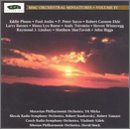| All Artists: Eddie Phoon, Paul Joslin, Peter [Tenor Vocal] Sacco, Robert Cannon Ehle, Larry Barnes, Mona Lyn Reese, Andy Teirstein, Steven Winteregg, Raymond J. Lindsay, Matthew MacTavish, John Biggs, Vit Micka, Robert Stankovsky, Robert Tomaro, Vladimir Valek, David Frederick Stock, Moravian Philharmonic Orchestra, Slovak Radio Symphony Orchestra (Bratislava), Slovak Radio Symphony Orchestra Bratislava, Czech Radio Symphony Orchestra (Bratislava) Title: MMC Orchestral Minatures, Vol. 4 Members Wishing: 0 Total Copies: 0 Label: Mmc Records Release Date: 3/23/1999 Genre: Classical Styles: Forms & Genres, Concertos, Historical Periods, Modern, 20th, & 21st Century, Symphonies Number of Discs: 1 SwapaCD Credits: 1 UPC: 761594206529 |
Search - Eddie Phoon, Paul Joslin, Peter [Tenor Vocal] Sacco :: MMC Orchestral Minatures, Vol. 4
 | Eddie Phoon, Paul Joslin, Peter [Tenor Vocal] Sacco MMC Orchestral Minatures, Vol. 4 Genre: Classical
|
Larger Image |
CD Details |
CD ReviewsA 5-star CD: 11 diverse modern American classical works. dpatton@azstarnet.com | Tucson, Arizona | 05/10/1999 (5 out of 5 stars) "MMC ORCHESTRAL MINIATURES - VOLUME IVA Listener's ReviewThis remarkable CD is a sampler - a buffet, if you will - of 11 works by modern American composers of classical music. It shows that modern American "classical" creation is not only alive and well, but vigorous. Many of the composers are still young and will no doubt be able to contribute yet more to the musical literature. It's fun to listen to, the pieces are all fairly brief, and the variety is outstanding. This CD would make an excellent gift for anyone who enjoys classical music and is not afraid of a little harmonic and rhythmic spice. It's also a good CD to listen to in your car.The CD starts out with what in my opinion is the most enjoyable piece, Eddie Phoon's "Winter Overture." Despite its title it conveys considerable warmth, and above all, a boundless energy. It opens with its first theme, an epic fanfare. The flute leads over a bridge to the second theme, a rising sequence in the high violins. With sudden harsh dissonances and energetic rhythmic patterns the two themes are played against each other, with wide tonal ranges from deep bass to piccolo. Every return has unexpected and delightful variations; the brass is satisfyingly full, and the short piece ends with a no-nonsense ending. This is one track I set on "repeat."This is not to minimize the exciting musical variety in the other works. Paul Joslin's "Hiroshima Idyll" briefly touches on Hiroshima before and after the bombing, with wistful evocations and modern-harmony variations on oriental themes. Peter Sacco's "Meditation #1" is more conventional; its occasional introspective dissonances have something for every instrument. In Robert Ehle's "Forests of the Night" different instruments repeat the initial bassoon arpeggio defining the main minor tonality throughout the piece, against winding themes, tying it together nicely.In Larry Barnes' "Morning Gigue" the soprano sax introduces an off-meter theme. Many instruments offer virtuoso variations of the main theme, a miniature Concerto for Orchestra. Despite frequent changes of meter, the themes repeat often enough so the listener can track the progressions.Mona Lyn Reese is the only woman composer on this CD, a sign of the paucity of women composers despite the excellent works of some of them. Her "Prince" joins jazz and classical forms; it quickly develops a very complex rhythmic pattern with elements of classical jazz, with counterpoint reminiscent of Dixieland. Its incandescent rhythmic complexity exudes energy.Andy Teirstein's "Maramures" (part of his viola concerto) also begins with an energetic complex rhythm and an unusual melodic line, which the program notes trace to themes heard in Carpathia. This part of the world has been a rich source for thematic and rhythmic material (Bartok, Enesco, Janacek).Steven Winteregg's "TGV" (France's Train à Grande Vitesse, high-speed train) is a delightful jazzy musical description of a train ride. Trains make good subjects and have inspired other composers (Honegger, Villa-Lobos). Raymond Lindsay's "Calling Card from Charlottesville" is a musical tour through Virginia. The program music sometimes sounds as if it may have been written for a movie.Matthew MacTavish's "Willows Weeping in a Mist" uses a melancholy descending pattern, with overlays added progressively, to portray the vague indistinctness of a mist. It progresses to an unexpected major-third ending.The last track, John Biggs' "Pastiche," is, as the name implies, a quilt of brief snatches of well-known classical themes, some overlaid. It's a classical "Name That Tune." It would be an excellent party quiz for people who think they know their classics! The astute listener should recognize works even from some characteristic 3-note bits. Unusual overlays include Prokofiev's "Love for Three Oranges" atop Beethoven's Fifth Symphony. This track is lots of fun and it is also good music in the pastiche style. It's a great choice for last-track: it leaves the listener in a good mood, at least this listener. This CD is well worth the price, and I recommend it without reservation.Listener's review by Dennis D. Patton 6502 North Pontatoc Road Tucson, AZ 85718-1620 (520) 299-0321 dpatton@azstarnet.com" Highly enjoyable dpatton@azstarnet.com | 06/02/1999 (5 out of 5 stars) "I thoroughly enjoyed this set of 11 pieces of modern classical music. All of the music is accessible to the unsophisticated ear. The people who put the CD together did a wonderful "bookending"-job by putting the two best pieces first and last. Mr. Phoon's Winter Ouverture made me think of Holst's Planets and Williams's Star Wars music. Mr. Biggs's Pastiche is undiluted fun in trying to discover all the themes and composers on which his work is based. Very highly recommended CD."
|

 Track Listings (11) - Disc #1
Track Listings (11) - Disc #1